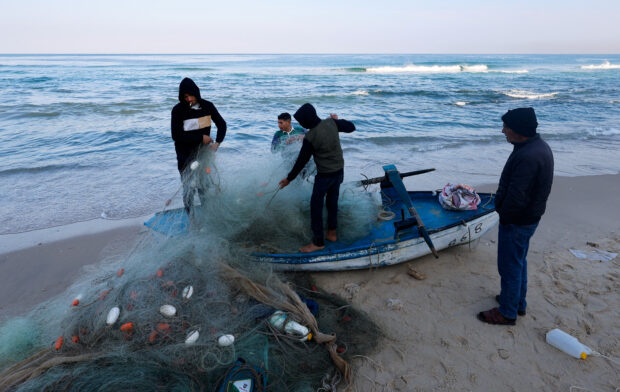
Palestinian fishermen work on the beach, amid the ongoing conflict between Israel and Palestinian Islamist group Hamas, in Rafah, in the southern Gaza Strip, January 16, 2024. REUTERS/Mohammed Salem
RAFAH, Gaza — Gaza fisherman Abdul Rahim al-Najjar risks his life every day rowing a dinghy into the waves under Israeli military surveillance to net an occasional crab or fish – tiny morsels of food on which his hungry family has come to rely.
The fishermen of the tiny Palestinian enclave have long been subject to strict Israeli prohibitions on how far out they can fish, but since the devastating war began on Oct. 7 they only dare venture about 100 meters (110 yards) from the shore.
More than three months of fighting, blockade and Israeli bombardment have pushed Gaza, which is ruled by the militant Palestinian group Hamas, to the brink of starvation, with U.N. assessments saying its people are at serious risk of famine.
For fishermen, barely able to cross the first swells of Mediterranean surf, let alone reach the deeper water where the larger shoals may be swimming, anything they catch is now vital to keep themselves and their families alive.
“It is very little. This is our fishing. You see? We cannot feed our children,” said Najjar, sitting on the beach and holding up a lone, scrawny crab he had pulled from his net.
Small girls sat watching Najjar as he worked, searching for morsels in the nets as he sorted them and hung them to dry.
READ: Major events during 100 days of war between Israel and Hamas
Before the war, fishermen used motors with their small boats and could range several kilometers from Gaza’s built-up shoreline. Now they head off in pairs with oars, one pulling them through the waves while the other stands to throw nets.
When they get more than 100 meters out, Israeli forces sometimes fire shells towards them to urge them back to shore, he said, amid increased security concerns linked to the war.
“We live according to what we fish. Despite what we are going through, we want to go fishing and live,” Najjar’s brother, Ibrahim who fishes with him.
Acute hunger
Why they are willing to brave shellfire for so small a reward is evident in Rafah town centre, where people queued at a charity kitchen. Children, their faces pinched, stood waiting to eat meagre, unaccompanied portions of lentils or pasta.
“Our bodies are failing due to lack of food. My children are ill from lack of food. It’s not enough. It’s barely enough for two people and must serve seven. It’s not even one meal,” said Mohammed al-Shondoghli, a displaced man at the kitchen.
Israel’s offensive in Gaza has killed more than 24,280 people, according to health authorities in the enclave, and driven most of its 2.3 million people from their homes.
Israel has vowed to destroy Hamas after militants from the group killed more than 1,200 people and seized 240 hostages during an Oct. 7 rampage into southern Israeli towns.
A U.N.-backed report in December said Gazans faced crisis levels of hunger, with the risks of famine rising daily. Recent footage showed a melee as hundreds of people in Gaza City rushed for a rare flour aid delivery.
At the charity kitchen a woman who gave her name as Um Mustafa said she had come too late and it was all gone when she reached the front of the long queue.
“I don’t know what I will feed my children. My father is elderly. He has a heart condition. Schools only give a bottle of water and two biscuits,” she said.

